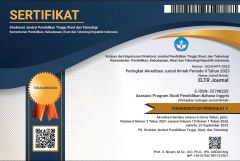THE CORRELATION BETWEEN STUDENTS’ SPEAKING ANXIETY AND THEIR SPEAKING PERFORMANCE IN AN EFL CONTEXT
Abstrak terlihat: 698 / PDF terunduh: 495DOI:
https://doi.org/10.37147/eltr.v3i1.62Keywords:
: speaking anxiety, speaking performance, EFL, correlation, major stressorsAbstract
Numerous studies have been conducted in investigating the role of foreign language speaking anxiety on students’ performance; facilitating (positive) or debilitating (negative) effects. Unfortunately, previous studies on this issue show that language anxiety negatively affected students’ performance in most cases. This study aimed to find out the correlation between speaking anxiety and speaking performance in EFL context and investigating the major stressors of English speaking anxiety perceived by the students involved in this study. Mixed method was applied in this study. Then, three instruments were used to collect the data; a questionnaire named FLCAS (Foreign Language Classroom Anxiety Scale), an interview, and a speaking test. The finding showed that there was no significant relationship between speaking anxiety and speaking performance. Furthermore, based on the finding from FLCAS and interview, the major stressors of speaking anxiety perceived by the participants were resulting from comparing one’s speaking skill to others, getting a spontaneous question, being concerned if they were grammatically incorrect and used wrong pronunciation, not understanding what the teacher said, and being unable to convey something in the target language. These major stressors were basically stemmed from fear of negative evaluation and communication apprehension.
Downloads
References
Ansari, M. S. (2015). Speaking anxiety in ESL/EFL classrooms: A holistic approach and practical study. International Journal of Educational Inverstigations, 2(4), 38-46.
Awan, R. N., Azher, M., Anwar, M. N., & Naz, A. (2010). An investigation of foreign language classroom anxiety and its relationship with students’ achievement. Journal of College Teaching & Learning, 7(11), 33-40.
Debreli, E. (2016). Sources and levels of foreign language speaking anxiety of English as a foreign language university students with regard to language proficiency and gender. International Journal of English Language Education, 4(1), 49-62.
Halonen, J. & Santrock, J.W. (1999). Psychology: Contexts and applications. (3th Ed.). New York, NY: McGraw-Hill Inc.
Horwitz, E. K., Horwitz, M. B., & Cope, J. A. (1986). Foreign language classroom anxiety. The Modern Language Journal, 70(2), 125-132.
Khattak, Z. I., Jamshed, T., Ahmad, A., & Baig, M. N. (2011). An investigation into the causes of English language learning anxiety in students at AWKUM. Procedia -Social and Behavioral Sciences, 15, 1600-1604. doi:10.1016/j.sbspro.2011.03.337
Krashen, S. D. (1982). Principles and practice in second language acquisition. New York, NY: Pergamon Press.
Latham. J. (2007). In choosing a qualitative sample. Retrieved from johnlatham.me/choosing-qualitative-sample/
MacIntyre, P. D. & Gardner, R. C. (1994). The subtle effects of language anxiety on cognitive processing in the second language. Language Learning, 44(2), 283-305).
Maulida, N. A. (2016). The correlation between students’ self-efficacy and their speaking performance. UPI Bandung, Indonesia: Unpublished.
Sari, Y. P., Nurkamto, J. & Pudjobroto, A. H. (2012). A correlational study between students’ anxiety, vocabulary mastery, and speaking skill (Bachelor’s paper). USM Surakarta, Indonesia.
Saville-Troike, M. (2006). Introducing second language acquisition. Cambridge, England: Cambridge University Press.
Williams, K. E., & Andrade, M. R. (2008). Foreign language learning anxiety in Japanese EFL university classes: Causes, coping, and locus of control. Foreign Language Teaching, 5(2), 181-191.
Young, D. J. (1991). Creating a low-anxiety classroom environment: What does
the language anxiety research suggest?. Modern Language Journal, 75, 425-439.
Downloads
Published
How to Cite
Issue
Section
License
Copyright (c) 2019 Rahma Faridila Amaliah

This work is licensed under a Creative Commons Attribution-ShareAlike 4.0 International License.













